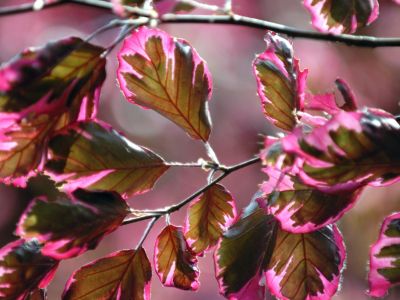1. Tricolor Beech – A Tree with Pink Leaves
European tricolor beech is a medium-sized tree, growing up to 35 feet (10.7 m.) tall and 25 feet (7.6 m.) wide. It is cold hardy through zone 4 and tolerates urban conditions. The foliage on this beech tree is a deep, purplish green with pale pink to rose margins and striking variegation between the two colors. It thrives in partial sun and cooler, wetter conditions. This is a striking landscaping tree for a garden focal point.
2. Weigela My Monet – A Bush with Pink Leaves
Weigela shrubs are related to honeysuckle and bloom profusely. This dwarf variety, My Monet, blooms in summer and only grows up to about two feet (0.6 m) tall at most. It’s a good shrub for edging and borders. You can also grow it in masses in beds or in containers. The name My Monet describes its painterly leaves. The foliage is striking and variegated with green and pink. If you grow this shrub in the shade, the pink will be very light, almost cream. In full sun, the edges of the leaves are fully pink.
3. Heuchera Midnight Rose – A Dark and Pink Variegated Plant
Heuchera, or coral bells, is a beloved perennial that comes in numerous varieties. Easy to grow, coral bells produce a low clump of leaves and tall flower stalks in spring. They come in many colors, including variations on pink. Midnight Rose has dark, nearly black leaves, blotched with pink. The pink spots start out bright and deep in spring and lighten to a creamy pink in summer. They grow in zones 4 through 9 and prefer full or partial sun.
4. Cherry Tart Sedum – Deep Pink Groundcover
This SunSparkler sedum, or stonecrop, is deep reddish-pink in color. Like many other sedums, this variety grows low to the ground, only about six inches (15 cm) tall. It has fleshy, succulent leaves and blooms pink in late summer. Use Cherry Tart against lighter-colored plants for a striking counterpoint. It can grow in partial shade or full sun, has low water needs, and can tolerate some drought and hot conditions.
5. Brazilian Red Hots – For Hot Climates
Unlike the other plants on this list, this variety of Joseph’s Coat is only hardy to USDA zone 9. It prefers hot and humid conditions and will grow in sun or partial shade with moist soil. Red Hots gets its name from the brightly-colored leaves. The foliage is variegated with deep red and hot pink. The fall flowers are not spectacular. This is a low shrub to grow for its outstanding foliage.
